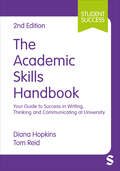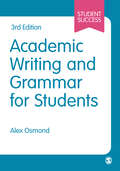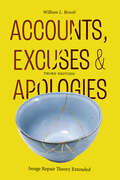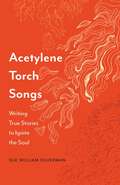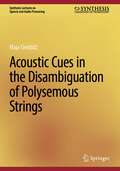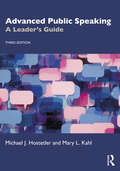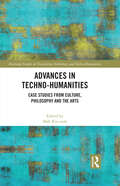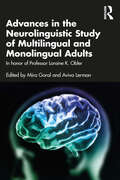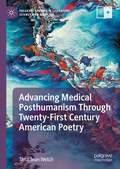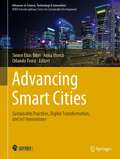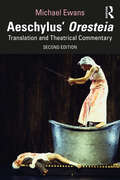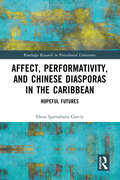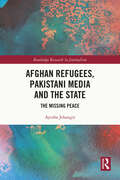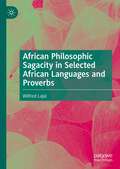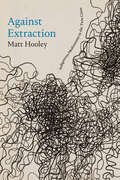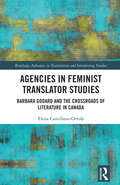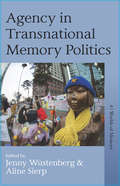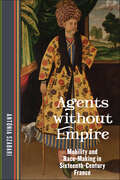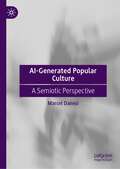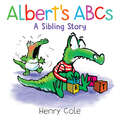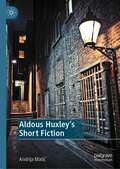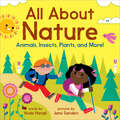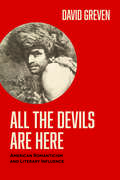- Table View
- List View
The Academic Skills Handbook: Your Guide to Success in Writing, Thinking and Communicating at University (Student Success)
by Diana Hopkins Tom ReidThis is your complete guide to success in navigating, writing, thinking, and communicating at university. Packed with tips, diagnostic tools, guided exercises, and full text examples, it equips you to boost your grades, ace your assignments, and get the most out of your time at university. This book helps you: Prepare for and navigate university culture Develop the academic skills needed for success at university Communicate your ideas with confidence and clarity Watch your skills grow with diagnostic tools Create your own study plan tailored to the skills you need Know what your tutor is looking for and how to deliver Turn your skills into success after university The Academic Skills Handbook is specially designed to show you where your strengths are and what you need to work on, so you get a practice plan that is perfect for your needs. It then arms you with the principles and practice to get ahead in your academic writing, presentations and group work. What′s new to this edition? Three chapters on university culture, writing blogs, and online and blended learning (including best practices for using AI as a support tool), as well as new annotated examples of course work and increased coverage of wellbeing. Student Success is a series of essential guides for students of all levels. From how to think critically and write great essays to boosting your employability and managing your wellbeing, the Student Success series helps you study smarter and get the best from your time at university.
The Academic Skills Handbook: Your Guide to Success in Writing, Thinking and Communicating at University (Student Success)
by Diana Hopkins Tom ReidThis is your complete guide to success in navigating, writing, thinking, and communicating at university. Packed with tips, diagnostic tools, guided exercises, and full text examples, it equips you to boost your grades, ace your assignments, and get the most out of your time at university. This book helps you: Prepare for and navigate university culture Develop the academic skills needed for success at university Communicate your ideas with confidence and clarity Watch your skills grow with diagnostic tools Create your own study plan tailored to the skills you need Know what your tutor is looking for and how to deliver Turn your skills into success after university The Academic Skills Handbook is specially designed to show you where your strengths are and what you need to work on, so you get a practice plan that is perfect for your needs. It then arms you with the principles and practice to get ahead in your academic writing, presentations and group work. What′s new to this edition? Three chapters on university culture, writing blogs, and online and blended learning (including best practices for using AI as a support tool), as well as new annotated examples of course work and increased coverage of wellbeing. Student Success is a series of essential guides for students of all levels. From how to think critically and write great essays to boosting your employability and managing your wellbeing, the Student Success series helps you study smarter and get the best from your time at university.
Academic Writing and Grammar for Students (Student Success)
by Alex OsmondFrom grammar and punctuation, to proofreading and fixing mistakes, this is your one-stop guide to improving your academic writing to achieve better grades at university. Including quotes from tutors and examples of good and bad practice, this book provides step-by-step guidance on Basic conventions of academic writing Critical thinking Conciseness and clarity Proofreading and referencing Common mistakes and how to avoid them. Student Success is a series of essential guides for students of all levels. From how to think critically and write great essays to boosting your employability and managing your wellbeing, the Student Success series helps you study smarter and get the best from your time at university.
Academic Writing and Grammar for Students (Student Success)
by Alex OsmondFrom grammar and punctuation, to proofreading and fixing mistakes, this is your one-stop guide to improving your academic writing to achieve better grades at university. Including quotes from tutors and examples of good and bad practice, this book provides step-by-step guidance on Basic conventions of academic writing Critical thinking Conciseness and clarity Proofreading and referencing Common mistakes and how to avoid them. Student Success is a series of essential guides for students of all levels. From how to think critically and write great essays to boosting your employability and managing your wellbeing, the Student Success series helps you study smarter and get the best from your time at university.
Accounts, Excuses, and Apologies, Third Edition: Image Repair Theory Extended
by William L. BenoitIn our constantly plugged-in and connected world, image is everything. People, groups, organizations, and countries frequently come under suspicion of wrongdoing and sometimes require defense. Accounts, Excuses, and Apologies describes the image-repair strategies that may be used to help defuse these threats.The Third Edition of this classic book builds on theories for rehabilitating a damaged reputation by adding two new forms of denial: straw denial (appearing to deny an accusation by sidestepping it) and deflecting attention (trying to get the audience to focus on something other than the accusations against you). Five contexts for image repair are examined: corporate, political, sports/entertainment, international, and third party (when one person or organization tries to repair the image of another). The book’s case studies include current instances of reputation repair, including Vladimir Putin on Ukraine and President Joe Biden on Afghanistan; Southwest Airlines on flight cancellations; Kobe Bryant on accusations of rape; and Donald Trump on the January 6 hearings.
Acetylene Torch Songs: Writing True Stories to Ignite the Soul
by Sue William SilvermanAt times writers—from the unpublished to jaded lifers—need a fire lit under them to pursue the complex work of self-exploration. Acetylene Torch Songs provides that spark for memoirists and essayists seeking mentor-based instruction and inspiration. Drawing on twenty-five years of teaching and mentoring writers, Sue William Silverman stresses practice over theory. She encourages craftiness as well as craft and urges writers to embark on emotional quests in pursuit of their art. Acetylene Torch Songs uniquely illustrates how the writer&’s imaginative spirit comes alive on the page through metaphor, literary masks, sensory memories, voice, obsessions, and more. This holistic approach to writing emphasizes how the creative process brings together the heart, mind, and senses to illuminate the human condition through language. Featuring a personal essay in each chapter, Silverman uses her own work to model a specific concept or approach, demonstrating how obsessions, secrets, and memories can burn on the page. Through guided prompts, worksheets, checklists, publishing advice, personal essays, and strategies, Silverman encourages writers to find the confidence and courage to write stories that reach beyond the page through their intimacy, social engagement, and honesty.
Acoustic Cues in the Disambiguation of Polysemous Strings (Synthesis Lectures on Speech and Audio Processing)
by Maja GwóźdźThis book provides an analysis of acoustic features of polysemous strings and an implementation of a speech disambiguation program based on the phonetic information. Throughout the book, the term ‘polysemous string’ refers to idioms with plausible literal interpretations, restrictive and non–restrictive relative clauses, and the same expressions used as quotations and appearing in a non–quotational context. The author explains how, typically, context is sufficient to determine the intended meaning. But there is enough evidence in psycholinguistic and phonetic literature to suspect that these superficially identical strings exhibit different acoustic features. In the experiment presented in the book, the participants were asked to read short excerpts containing corresponding elements of polysemous strings placed in the same intonational position. The acoustic analyses of ditropic pairs and subsequent statistical tests revealed that there is almost no difference in the duration, pitch, or intensity in literal and figurative interpretations. However, the analysis of relative clauses and quotations demonstrated that speakers are more likely to use acoustic cues to differentiate between the two possible readings. The book argues that the acoustic analysis of polysemous phrases could be successfully implemented in designing automatic speech recognition systems in order to improve their performance in disambiguating polysemous phrases.Analyzes acoustic features of polysemous strings and an implementation of a speech disambiguation programIncludes evidence that superficially identical strings exhibit different acoustic featuresArgues that acoustic analysis of polysemous phrases can be successfully implemented in automatic speech recognition
Advanced Public Speaking: A Leader's Guide
by Michael J. Hostetler Mary L. KahlNow in its third edition, this comprehensive textbook is designed to serve as a speech-making reference for advanced students of public speaking.The book presumes that readers have prior experience with basic public speaking skills and seeks to enhance those abilities with references to classical concepts, the inclusion of sample speeches, and questions for speech criticism. This new edition includes a greater diversity of speeches and new material on populist rhetoric and civility to outline the importance of civic discourse in an age of polarization. It also includes suggestions for speaking to remote audiences.Providing users with the opportunity to increase their speaking abilities across a wide variety of complex and specific contexts, this student-engagement focused and flexible text serves as a core textbook for upper-level undergraduate public speaking courses.Online resources for instructors include an instructor’s manual and test bank offering guidance on syllabus construction, lecture content, and classroom activities. They are available at www.routledge.com/9781032531861.
Advances in Techno-Humanities: Case Studies from Culture, Philosophy and the Arts (Routledge Studies in Translation Technology and Techno-Humanities)
by Mak Kin-WahThis book is a pioneering attempt to explore the relationships between technology and the humanities through case studies and specific contexts in the areas of language, theatre, literature, translation, philosophy, music, home designations, learning environment, and artificial intelligence. Written by scholars and specialists across various fields, the chapters explore the emerging field of techno-humanities. This book examines the development of language and society by means of Big Data, how technology is integrated into the theatres of Hong Kong and the ensuing results of such integration. The authors also highlight how technology is able to analyse, understand, and visualise literary works and to bring drastic changes to translation in the past seven decades. Long-standing philosophical issues are re-examined, linkages between technology and theoretical concepts are illuminated, and the emotional aspects of computational applications are investigated. This book also delves into insightful case studies such as providing suggestions to train novice translators through corpus-assisted translation teaching, analysing patterns of housing names, and discovering a new online method to acknowledge acquisition through authentic learning experiences. Overall, this book serves as a point of departure for us to go deeper into the role of technology in transforming the humanities in this digital age. This is a useful read for students and scholars interested in learning more about the cross section between humanities and technology.
Advances in the Neurolinguistic Study of Multilingual and Monolingual Adults: In honor of Professor Loraine K. Obler (Psychology Press Festschrift Series)
by Aviva LermanThis edited volume examines current themes in the neurolinguistic study of multilingual and monolingual adults and highlights several new directions the field is moving toward. The organization of the book is as follows. Part I focuses on language processing in multilingual and monolingual adults, Part II explores language processing in multilingual and monolingual adults with dementia, and Part III centers on language processing in multilingual and monolingual adults with stroke-induced aphasia. Chapters feature empirical data and/or literature reviews, discussing the key issues in the field that are currently engaging scholars and practitioners with topics including language attrition, cognitive flexibility, aging and the brain, eye-tracking studies of aphasia, translanguaging, and multilingualism in dementia. The book includes cuttingedge research from researchers and practitioners who are all alumni and colleagues of Professor Loraine K. Obler, to whom this book is dedicated. Presenting crucial topics in the field, the book is highly relevant for students, researchers, and practitioners in the fields of neurolinguistics, psycholinguistics, sociolinguistics, applied linguistics, and language disorders.
Advancing Medical Posthumanism Through Twenty-First Century American Poetry (Palgrave Studies in Literature, Science and Medicine)
by Tana Jean WelchAdvancing Medical Posthumanism Through Twenty-First Century American Poetry places contemporary poetics in dialogue with posthumanism and biomedicine in order to create a framework for advancing a posthuman-affirmative ethics within the culture of medical practice. This book makes a case for a posthumanist understanding of the body—one that sees health and illness not as properties possessed by individual bodies, but as processes that connect bodies to their social and natural environment, shaping their capacity to act, think, and feel. Tana Jean Welch demonstrates how contemporary American poetry is specifically poised to develop a pathway toward a posthuman intervention in biomedicine, the field of medical humanities, medical discourse, and the value systems that guide U.S. healthcare in general.
Advancing Smart Cities: Sustainable Practices, Digital Transformation, and IoT Innovations (Advances in Science, Technology & Innovation)
by Simon Elias Bibri Anna Visvizi Orlando TroisiThis book presents a comprehensive exploration of the transformative journey toward smart cities and the implementation of cutting-edge technologies in urban development. Divided into four distinct parts, it covers a broad range of topics that contribute to sustainable, efficient, and innovative urban living. Encompassing diverse research from IEREK's Future Smart Cities (FSC) conference, it focuses on smart city advancement through sustainable practices, digital transformation, and IoT integration. Covering topics such as smart buildings, urban planning during pandemics, and IoT applications in health care and agriculture, this book shapes the future of urban living. It delves further into opportunities in city regeneration, human-centric smart design, IoT data effectiveness, and more. A valuable resource for academics, researchers, and policymakers, it offers insights into telecommunications, AI, smart manufacturing, and methodologies for urban ecosystem improvement.
Aeschylus' Oresteia: Translation and Theatrical Commentary
by Michael EwansThis is a fully revised new edition of Michael Ewans’ 1995 English translation of the Oresteia, taking into account the extensive work published on the trilogy in recent years.Accompanying this lucid, accurate and actable translation is a substantial introduction, outlining the festival setting of the plays, the original performance conditions and performance style, the form and meaning of the trilogy, the issues surrounding the act of translation, and finally a survey of some major productions since 1980. The text itself is a thoroughly competitive translation into modern English verse, now significantly revised in the light of recent scholarship on the text. It is followed by a theatrical commentary on each scene and chorus, providing unique insights into how the plays might have been staged in ancient Athens and how they can be staged today. The book also includes notes on the translation, two glossaries of names and Greek terms, selected further reading, and a chronology of Aeschylus’ life and times.Aeschylus’ Oresteia: Translation and Theatrical Commentary is the most comprehensive English edition of Aeschylus’ masterpiece, and this new edition fully meets the needs of teachers, students and practitioners working on the trilogy as well as those interested in ancient Greek drama and literature more broadly.
Affect, Performativity, and Chinese Diasporas in the Caribbean: Hopeful Futures (Routledge Research in Postcolonial Literatures)
by Elena Igartuburu GarcíaAffect, Performativity, and Chinese Diasporas in the Caribbean: Hopeful Futures analyzes the emergence of Chinese diasporic literature and art in the Caribbean and its diasporas in the twenty-first century. This book considers the historical and critical discourse about the Chinese diasporas in the Caribbean and proposes a textual and visual archive selecting contemporary texts that signal a changing paradigm in postcolonial literature at the turn of the twenty-first century. Whereas, historically, Chinese minorities had been erased or presented as ultimate Others, contemporary texts mobilize Chinese characters and their stories strategically to propose alternative configurations of community and belonging grounded in affective structures and contest the coloniality of national imaginaries.
Afghan Refugees, Pakistani Media and the State: The Missing Peace (Routledge Research in Journalism)
by Ayesha JehangirDrawing on the frameworks of peace journalism, this book offers new insights into the Pakistani media coverage of Afghan refugees and their forced repatriation from Pakistan. Based on a three-year-study, the author examines the political, social and economic forces that influence and govern the reporting practices of journalists covering the protracted refugee conflict between Pakistan and Afghanistan. Through a critical discourse analysis of the structures of journalistic iterability of Afghan refugees in Pakistan, the author distils four dominant and three emerging frames, and proposes a new teleological turn for peace journalism as deliberative practice, that is to say practice that by promoting transparency and accountability (recognition) and challenging dominant power-proposed narratives and perspectives (resistance) encourages public engagement and participation (cosmopolitan solidarity). The author also privileges an analytical approach that conceptualises the nexus between digital witnessing and peace journalism through the paradigm of cosmopolitanism. The author finds routinely accommodated media narratives of security that represent Afghan refugees as a ‘threat’, a ‘burden’ and the ‘other’ that, through reinforcement, have become an incontestable reality for the public in Pakistan. This book will appeal to those interested in studying and practicing journalism as a conscientious communicative practice that elicits the very public it seeks to inform.
African Philosophic Sagacity in Selected African Languages and Proverbs
by Wilfred LajulThis book explores African philosophic sagacity, or wisdom philosophy, as proposed by Odera Oruka in his “Four Trends in Current African Philosophy” (1981), which he later expanded to six trends (1998). Oruka defines philosophic sagacity as wisdom philosophy, or philosophy of the wise men of Africa who are independent, liberal and non-conformist thinkers, and who often deviate from the accepted common norms of their societies. This book takes philosophic sagacity discourse beyond Oruka’s definition by encompassing traditional wise sayings and proverbs. It combines individual liberal thinkers and the communal ideas, and cherishes both rational and emotional engagement, offering a broader understanding of African philosophic sagacity. Wilfred Lajul opens the door for new researchers to venture into the study of African languages, wisdom sayings, and proverbs, and helps to unveil the content of this philosophy from the perspective of different African societies.
Against Extraction: Indigenous Modernism in the Twin Cities
by Matt HooleyIn Against Extraction Matt Hooley traces a modern tradition of Ojibwe invention in Minneapolis and St. Paul from the mid-nineteenth century to the present as that tradition emerges in response to the cultural legacies of US colonialism. Hooley shows how Indigenous literary and visual art modernisms challenge the strictures of everyday life and question the ecological, political, and cultural fantasies that make multivalent US colonialism seem inevitable. Hooley analyzes literature and art by Louise Erdrich, William Whipple Warren, David Treuer, George Morrison, and Gerald Vizenor in relation to histories of Indigenous dispossession and occupation, enslavement and Black life, and environmental harm and care. He shows that historical narratives of these cities are intimately bound up with the violence of colonial systems of extraction and that concepts like Indigeneity and sovereignty extend beyond treaty-granted promises of political control. These works, created in opposition and proximity to the extraction of cultural, political, and territorial resources, demonstrate how Indigenous claims to life and land matter to rethinking and unmaking the social and ecological devastations of the colonial world.
Agencies in Feminist Translator Studies: Barbara Godard and the Crossroads of Literature in Canada (ISSN)
by Elena Castellano-OrtolàThis book sets out a new framework for a feminist history of translators, drawing on the legacy of Canadian scholar Barbara Godard and her work in establishing the Canadian literary landscape as a means of exploring agency in feminist translation studies and its implications for cross-disciplinary debates.The volume is organised in three sections, establishing feminist translator studies as its own approach, examining these dynamics at work in a comprehensive portrait of Barbara Godard’s scholarly and literary history, and looking ahead to future directions. In situating the discussion on Godard and Canadian literary history, Elena Castellano calls attention to a geographic context in which translation and its practice has been at the heart of debates around national identity and intersected with the rise of feminism and feminist literary scholarship. The book demonstrates how an in-depth exploration of the agency of an individual stakeholder, whose activities spanned diverse communities and oft conflicting interests, can engage in key questions at the intersection of nation-making, translation, and feminism, paving the way for future research and the further development of feminist translator studies as methodological framework.This book will be of interest to scholars in translation studies, feminist literature, cultural history, and Canadian literature.
Agency in Transnational Memory Politics (Worlds of Memory #4)
by Jenny Wüstenberg and Aline SierpThe dynamics of transnational memory play a central role in modern politics, from postsocialist efforts at transitional justice to the global legacies of colonialism. Yet, the relatively young subfield of transnational memory studies remains underdeveloped and fractured across numerous disciplines, even as nascent, boundary-crossing theories on topics such as multi-vocal, traveling, or entangled remembrance suggest new ways of negotiating difficult political questions. This volume brings together theoretical and practical considerations to provide transnational memory scholars with an interdisciplinary investigation into agency—the “who” and the “how” of cross-border commemoration that motivates activists and fascinates observers.
Agents without Empire: Mobility and Race-Making in Sixteenth-Century France
by Antónia SzabariIt is well known that Renaissance culture gave an empowering role to the individual and thereby to agency. But how does race factor into this culture of empowerment? Canonical French authors like Rabelais and Montaigne have been celebrated for their flexible worldviews and interest in the difference of non-French cultures both inside and outside of Europe. As a result, this period in French cultural history has come to be valued as an exceptional era of cultural opening toward others. Agents without Empire shows that such a celebration is, at the very least, problematic. Szabari argues that before the rise of the French colonial empire, medieval categories of race based on the redemption story were recast through accounts of the Ottoman Empire that were made accessible, in a sudden and unprecedented manner, to agents of the French crown. Spying performed by Frenchmen in the Ottoman Empire in the sixteenth century permeated French culture in large part because those who spied also worked as knowledge producers, propagandists, and artists. The practice changed what it meant to be cultured and elite by creating new avenues of race- and gender-specific consumption for French and European men that affected all areas of sophisticated culture including literature, politics, prints, dressing, personal hygiene, and leisure.Agents without Empire explores race making in this period of European history in the context of diplomatic reposts, travel accounts, natural history, propaganda, religious literature, poetry, theater, fiction, and cheap print. It intervenes in conversations in whiteness studies, race theory, theories of agency and matter, and the history of diplomacy and spying to offer a new account of race making in early modern Europe.
AI-Generated Popular Culture: A Semiotic Perspective
by Marcel DanesiThis book gives a general overview of Artificial Intelligence as it is impacting on the world of the arts and culture. What is AI-generated pop culture? What does a movie, a musical work, a novel, or song created entirely by a generative AI imply in terms of our notions of creativity? What is the semiotic dynamic (the meaning-making impulse that humans imprint in sign and textual forms) that is involved in an AI-produced work? No comprehensive treatment exists of the profound implications that AI-generated pop culture entails, including how it might affect cultural evolution and how we interpret artistic artifacts. Such a treatment is critical at this moment, and this book aims to fill this gap.
Albert's ABCs: A Sibling Story
by Henry ColeOver the course of a day, big brother Albert manages his interactions with his little brother Baxter and the feelings that result, in this relatable romp through the alphabet.Big brother Albert gets increasingly frustrated with little brother Baxter. Crying! Diaper! Hungry! Irritated! A normal day and a familiar sibling interaction escalate alphabetically until Grandma resolves all the problems, with an X for a kiss goodnight, followed by Yawn, and, of course, ZZZZ.
Aldous Huxley's Short Fiction
by Andrija MatićAldous Huxley’s Short Fiction analyzes Huxley’s short stories within a modernist context, highlighting that he shared more characteristics with distinguished modernists than is usually believed. The book also explores other features of Huxley’s short stories, focusing on themes such as consumerism, mainstream education, shallow intellectualism, women’s emancipation, toxic masculinity, and sensational journalism, themes that correspond with both Huxley’s time and our world, and position him among the most prophetic authors of the twentieth century. This study demonstrates that Huxley’s short fiction can provide answers to questions that remain confusing or partially explained in the research on Huxley’s work. It illustrates the constants and changes in Huxley’s opinions on organized religion, mysticism, and the relation between sexuality and spirituality, while also clarifying Huxley’s political opinion, which is often misunderstood due to his advocacy of pacifism. Finally, the in-depth interpretations of Huxley’s short stories reveal the dynamics of his literary style, especially his complex humor and irony, areas he developed more than any other modernist author of short fiction.
All About Nature: Animals, Insects, Plants, and More! (The\all About Picture Book Ser.)
by Huda HarajliDiscover the world outside—an introduction to nature for kids ages 3 to 5Can you feel the sun? Hear the birds singing? See colorful leaves on the trees? That's nature! This picture book of fun facts teaches toddlers all about land, water, air, and critters big and small. Watch them discover their inner explorer as they look for different kinds of rocks, spot stars in the sky, and learn to love the great outdoors.Our amazing planet—Find out why it gets dark at night, meet some interesting insects, and explore how people are a part of nature, too.Illustrations everywhere—Every page is bursting with vibrant artwork of objects in nature and other kids celebrating the world around them.Vocabulary building—Check out a list of nature words and their definitions to help little ones understand all the amazing new things they've learned.Get this amazing nature book for kids today and see what makes exploring nature so much fun!
All the Devils Are Here: American Romanticism and Literary Influence
by David GrevenThe English literary influence on classic American novelists&’ depictions of gender, sexuality, and race With All the Devils Are Here, the literary scholar David Greven makes a signal contribution to the growing list of studies dedicated to tracing threads of literary influence. Herman Melville&’s, Nathaniel Hawthorne&’s, and James Fenimore Cooper&’s uses of Shakespeare and Milton, he finds, reflect not just an intertextual relationship between American Romanticism and the English tradition but also an ongoing engagement with gender and sexual politics. Greven limns the effect of Shakespeare&’s Much Ado about Nothing on Hawthorne&’s exploration of patriarchy, and he shows how misogyny in King Lear informed Melville&’s evocation of &“the step-mother world&” of orphaned men in Moby-Dick. Throughout, Greven focuses particularly on male authors&’ treatment of femininity, arguing that the figure of woman functions for them as a multivalent signifier for artistic expression. Ultimately, Greven demonstrates the ambitions of these writers to comment on the history of the Western tradition and the future of art from their unique positions as Americans.
